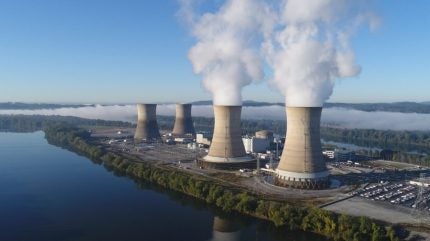
US Constellation Energy plans to restart unit 1 at the Three Mile Island (TMI) NPP in order to sell the power to Microsoft for its data centres to support the growing demand for artificial intelligence (AI). Constellation expects the unit to come back online in 2028, subject to approval by the Nuclear Regulatory Commission (NRC) and also plans to apply to extend the plant’s operations to at least 2054.
TMI comprises two pressurised water reactors (PWRs). The 819 MWe unit 1 operated from 1974 to 2019. The 906 MWe unit 2 began operation in 1978 but was permanently closed the following year following a martial core meltdown due to a cooling malfunction. TMI-2 Solutions plans to continue assessing the level of radioactivity in the reactor building, including using robots to take samples of concrete walls in the building’s basement. The company plans to start removing what remains of TMI-2’s damaged core by mid-2022. It expects to complete the entire clean-up process by 2037. Some 99% of TMI-2’s fuel has been moved to Idaho since the 1979 accident. But officials say removing the last 1% of fuel is challenging.
Microsoft has agreed to purchase electricity from TMI-1 in a 20-year agreement to match the energy its data centres consume. Constellation described the agreement with Microsoft as the largest power purchase agreement that it has ever signed. “The decision here is the most powerful symbol of the rebirth of nuclear power as a clean and reliable energy resource,” Constellation CEO Joe Dominguez told investors.
Unit 1 closed in 2019 for economic reason in face of competition from cheap natural gas and renewables. Constellation plans to rename the plant the Crane Clean Energy Centre after Chris Crane, CEO of Constellation’s former parent company who died in April. Constellation Chief Financial Officer Dan Eggers said $1.6bn would be invested to restart the plant by 2028.
TMI-1 would be the second US nuclear plant to restart following the Palisades plant in Michigan, which is expected to return to service at the end of 2025.
Constellation expects NRC to complete the review of TMI in 2027, Eggers said. The review includes a safety and environmental impact study. “Based on our expertise on plant licensing and regulatory processes and through observation of the Palisades restart, we are highly confident we’ll be able to restore the plant’s operational licensing authority to the same state that existed prior to the shutdown in 2019,” Eggers said. He added that the largest US grid operator, PJM Interconnection, will also have to review TMI’s impact on the grid before the nuclear plant can restart. Constellation plans to submit a grid interconnection request to PJM in 2025. PJM Interconnection operates the electric grid in 13 states, including Pennsylvania and New Jersey.
A study commissioned by the Pennsylvania State Building & Construction Trades Council, which supports the restart and represents more than 115 local unions, estimated that the project would create 3,400 jobs, including 600 direct jobs at the plant.
Dominguez said the plant remains in “pretty good condition,” although Constellation needed to replace the main transformer. Other tasks include ordering key components, hiring staff, and connecting the plant to PJM, he added. He acknowledged that TMI “will always be remembered by some people as the industry’s point of greatest failure in the United States”. However, “for those of us who worked and have worked in the industry for decades, Three Mile Island represents something very different. It represents the place where we learned hard lessons and the birthplace of the resolve, the new processes, new equipment, new designs through construction activities that ultimately transformed the industry.”
Constellation plans to fund the restart project from its own finances rather than seeking state or federal support. By contrast, Holtec International is planning to restart Palisades NPP supported by some $1.8bn in conditional funding from the US Department of Energy and the state of Michigan.
Researched and written by Judith Perera






